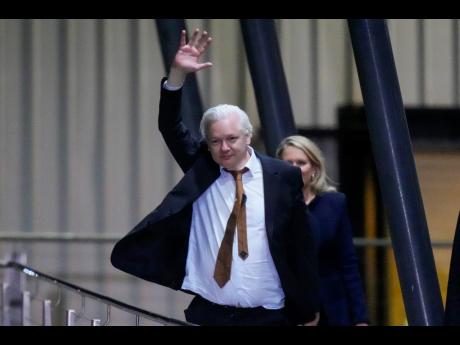Editorial | Not a gain for journalism
At a personal level, everyone should be happy for Julian Assange. After more than a dozen years of self-imposed confinement or being in jails, Mr Assange is a free man, in his native Australia with his family.
But journalism, if it didn’t quite lose, made no significant gain in the deal that gave Mr Assange his freedom.
Jamaica does have a stake in this matter. But for the statute of limitations, the publishers and editors of this newspaper could, as Mr Assange was in Saipan this week, be in the docks somewhere, defending charges by the United States of being accessories after the fact to espionage.
In 2011, The Gleaner was among newspapers around the world that published information from US diplomatic cables, made available by Mr Assange’s whistleblowing website, WikiLeaks.
Those were part of a trove of over 700,000 military and diplomatic documents, covering the years 1966 to 2010, that were leaked by a US Army intelligence analyst, Chelsea Manning. Ms Manning was court-martialled in 2013 and sentenced to 35 years, which was eventually commuted to seven by President Barack Obama.
Significantly, the Obama administration attempted to prosecute neither Mr Assange nor WikiLeaks, apparently appreciating the chilling effect that such a move could have on the practice of journalism globally. It also probably had an eye on US journalistic history.
However, Donald Trump, who succeeded Mr Obama, had no such qualms or considerations. In 2019, the Trump administration indicted Mr Assange on 18 charges of conspiring with, and aiding Ms Manning to obtain the classified information.
It also attempted to extradite Mr Assange to the United States from Britain after he was kicked out of Ecuador’s embassy, where he had been holed up for seven years, his immunity, granted by President Rafael Correa, was rescinded by the country’s new president, Lenín Moreno. The Ecuador’s protection had allowed Mr Assange to avoid extradition to Sweden over rape accusations which were subsequently abandoned.
POLITICAL SETTLEMENT
Until this week, he was flown to Saipan in the Northern Mariana Islands, in western Pacific Ocean, to plead guilty on one of the counts and freed, Mr Assange was in British jail fighting the attempts to extradite him to the US. What eventually happened was a political settlement, brokered, in the end, by Australia’s Labour Party government of Anthony Albanese.
It is understandable that Mr Assange and his family – he fathered two children while in the Ecuadorian embassy and got married while in jail – wanted to put this episode behind them. But, although the United States gained only a fig leaf, journalism didn’t win.
Among the ways Mr Assange describes himself is a journalist. WikiLeaks, fundamentally, is a journalistic platform.
What Mr Assange did with respect to Ms Manning and the leaked files is what journalists regularly do. They cultivate sources, including whistleblowers, and publish information that is, more often than not, to the greater good of society and of the people who consume news.
It is doubtless that the Chelsea Manning trove discomfited the US establishment. It disclosed how America spied on foreign partners and friends; and kept digital tabs on, lied to its citizens about its behaviour around the world, and revealed foes were tortured in Iraq.
In a sense, Manning channelled the spirit of Daniel Ellsberg, the Vietnam era policy analyst, with his 1971 leak of the Pentagon Papers, which laid bare how successive US administrations hadn’t told the truth about the war, including the likelihood of an American victory. Mr Ellsberg was the first person prosecuted under the Espionage Act. He was acquitted.
PARALLELS
There are parallels, too, between WikiLeaks’ release of the Chelsea Manning files and the decision by the New York Times (which broke the story but was forced for a time to suspend its coverage because of a court injunction) and the Washington Post to publish the Pentagon Papers.
Attempts by the Nixon administration to curtail the newspapers’ reporting went all the way to the Supreme Court. The government lost. Arguments in favour of freedom of the press and of its role in shedding light on the abuse of power prevailed.
The Pentagon Papers saga is still revered as a high point of American journalism.
In late 1999, the managers and editors of Jamaican media stood in Gordon House, Jamaica’s Parliament, wearing masks, protesting a clause in the law requiring public officials to report their assets. The offending provision would have subjected reporters to fines and jail sentences for disclosing certain information.
The media took a principled stance in support of press freedom.
Julian Assange deserves his freedom. This newspaper wishes him well and hopes that WikiLeaks, and similar ventures that shine light on what the powerful would prefer to keep hidden, continue to prevail.
But Mr Assange’s guilty plea left a dangerous bit of journalistic business unresolved. Jamaican, and all journalism, has an interest in its appropriate resolution, not least in America’s extraterritorial application and enforcement of its laws.

